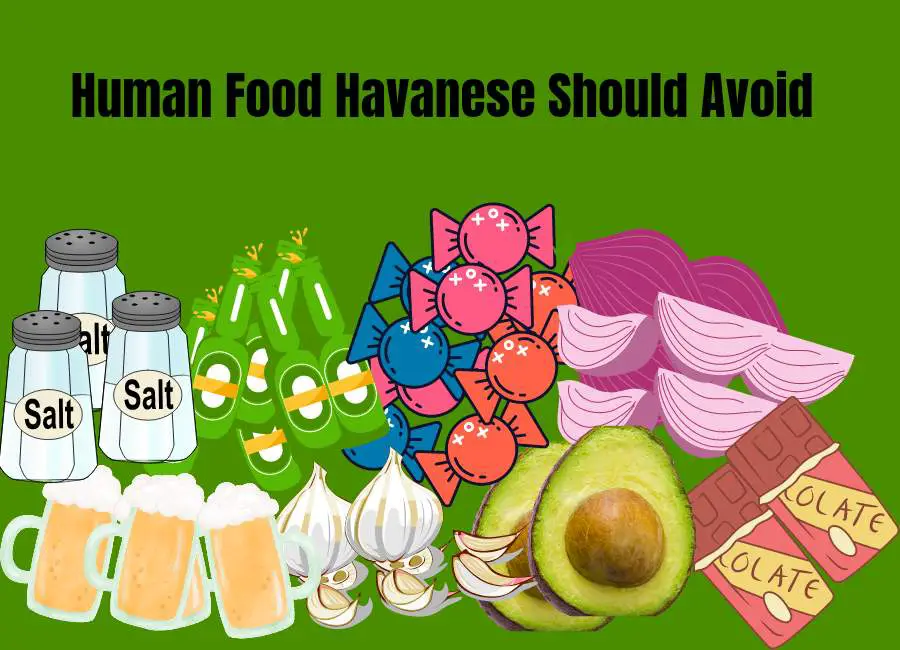13 Top Human Food Havanese Should Avoid

In this blog post, we’ll explore some of the foods that Havanese should avoid, and provide tips for keeping your pup happy and healthy.
So, if you want to make sure your Havanese is getting the best possible nutrition, keep reading!
Human Food Havanese Should Avoid
The following are some common human food Havanese should avoid:
1. Xylitol products
A common sugar replacement, xylitol can be found in sugar-free gum, candy, and baked goods.
When consumed by dogs, xylitol can trigger the production of insulin, which can result in hypoglycemia (low blood sugar).
Intoxication with xylitol can cause vomiting, lack of coordination, and seizures.
In extreme circumstances, consuming xylitol can result in liver failure and even death.
2. Coffee and Caffeine
Methylxanthine is a compound found in coffee and other caffeinated drinks that can make dogs experience symptoms like vomiting, diarrhea, restlessness, and rapid breathing.
In extreme circumstances, consuming excessive caffeine in Havanese dogs can result in tremors, convulsions, and even death.
3. Chocolate
Theobromine, a substance found in chocolate, can be poisonous to Havanese dogs.
Theobromine levels rise with increasing chocolate darkness, making darker chocolates more harmful to canines.
A number of symptoms, such as nausea, diarrhea, hyperactivity, and seizures, can occur when theobromine is ingested.
Theobromine poisoning can be lethal in severe circumstances.
4. Grapes and Raisins
Although the precise component of grapes and raisins induce toxicity in dogs is unknown, it has been documented that kidney failure can occur in some dogs.
Within hours of intake, poisoning symptoms, such as vomiting, diarrhea, and lethargy, may manifest.
In serious circumstances, Havanese dogs could experience renal failure and need to be hospitalized.
5. Onions and Garlic
Thiosulphate, a substance found in onions and garlic, can harm a Havanese dog’s red blood cells and cause anemia.
Weakness, vomiting, and loss of appetite are some of the signs of onion or garlic poisoning.
In severe circumstances, Havanese dogs may require blood transfusions to replace the damaged red blood cells.
6. Avocado
Persin, a substance found in avocados, can be poisonous to dogs especially small dogs like Havanese.
Although the amount of persin in an avocado varies depending on the kind and degree of ripeness, eating avocado might cause vomiting and diarrhea in dogs.
In extreme situations, eating excessive avocado by Havanese dogs might harm your pup’s heart and even kill your pup.
7. Excessive Alcohol
Alcohol can be particularly poisonous to Havanese dogs, so it should never be given in excess to them.
Drinking too much alcohol can result in symptoms like vomiting, diarrhea, respiratory problems, and even coma or death.
Ingesting alcoholic beverages or foods, such as beer, wine, or rum cake, can result in alcohol poisoning.
8. Macadamia nuts
In Havanese dogs, macadamia nuts can lead to weakness, lethargy, overheating, tremors, and vomiting.
Despite the fact that the precise origin of this toxicity is unknown, it is recommended to keep macadamia nuts away from your Havanese.
9. Fatty foods
Havanese dogs who consume fatty meals like bacon, sausage, and fried foods may get pancreatitis, a condition in which the pancreas becomes inflamed and becomes incapable of performing its normal functions.
Pancreatitis signs and symptoms include nausea, constipation, and stomach pain.
10. Cooked bones
Cooked bones can splinter and harm a Havanese dog’s digestive system, induce intestinal obstructions, or cause choking.
Raw bones are preferable, but you should watch your Havanese while they eat on them to avoid any mishaps.
11. Dairy products
Many Havanese dogs are lactose intolerant, and when they ingest dairy products like milk, cheese, and yogurt, they may have diarrhea, vomiting, and other digestive issues.
It is important to start with small doses and watch your Havanese’s reaction if you want to feed them dairy products.
12. Salt
Havanese dogs who consume too much salt may become dehydrated, and experience high blood pressure, nausea, diarrhea, and seizures.
Limiting your Havanese’s salt consumption is crucial, as is keeping them away from commercial meals with added salt.
13. Spicy foods
Due to their delicate digestive systems, Havanese dogs might get vomiting, diarrhea, and other gastrointestinal issues from eating spicy meals.
Moreover, spicy meals can itch and hurt their eyes and skin, irritating both.
Learn more about caring for a Havanese dog.
14. Human medicine
Medications that are safe for humans can be toxic to Havanese dogs.
Painkillers, anti-inflammatory drugs, and other over-the-counter medications can cause liver or kidney damage, gastrointestinal bleeding, and other serious health problems.
Always consult with your veterinarian before giving any medication to your Havanese, even if it’s an over-the-counter medication.
Conclusion
So, there you have it – a rundown of some of the human foods that you should be careful about when it comes to feeding your Havanese.
By avoiding these items and sticking to a nutritious, balanced diet, you can help ensure that your furry friend stays healthy and happy for years to come.
If you’re ever unsure about what to feed your Havanese or have concerns about their diet or health, be sure to talk to your veterinarian for advice and guidance.
With a little knowledge and care, you can help your beloved pup live its best life.
